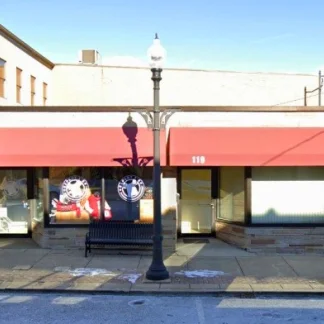The Counseling Center of Wayne and Holmes Counties
The Counseling Center of Wayne and Holmes Counties is a private rehab located in...
Anazao Community Partners - East Market Street offers outpatient treatment for individuals with alcohol and/or substance addiction. The program includes individual counseling, group therapy, individualized treatment and more. Anazao Community Partners - East Market Street is located at Orrville, Ohio.
Anazao Community Partners serves a mixed outpatient population presenting problems with a broad spectrum of behavioral health issues. Anazao’s programs are licensed by the Ohio Department of Mental Health and Addiction Services and accredited by the Commission on Accreditation of Rehabilitation Facilities (CARF).
The recovery model is based in the belief that recovery is a life-long growth process. Relapse is recognized as part of that process. Anazao’s service delivery system focuses on instilling hope in the recovering individual of achieving personal life goals while encouraging the individual to accept life challenges one step at a time. In this way, they promote the individual’s strengths and help them in the acceptance and management of their disability. An integral part of this process is the partnership between the individual, family and significant others, the recovery team and the community.
Anazao embraces and promotes a “recovery model” of service delivery that is consistent with the best practice models adopted by the Ohio Department of Mental Health and Addiction Services and the Mental Health and Recovery Board of Wayne and Holmes Counties. The overall focus of Anazao’s service delivery system is to assist the recovering individual in attaining reasonable personal lifetime goals and enhanced life experiences.
Contact us for more information: (330) 682-4800

Connect with Anazao Community Partners by calling their admissions team directly.
(330) 682-4800 Website Get DirectionsThe Commission on Accreditation of Rehabilitation Facilities (CARF) is a non-profit organization that specifically accredits rehab organizations. Founded in 1966, CARF's, mission is to help service providers like rehab facilities maintain high standards of care.
CARF Accreditation: Yes
Cognitive Behavioral Therapy (CBT) is a therapy modality that focuses on the relationship between one's thoughts, feelings, and behaviors. It is used to establish and allow for healthy responses to thoughts and feelings (instead of unhealthy responses, like using drugs or alcohol). CBT has been proven effective for recovering addicts of all kinds, and is used to strengthen a patient's own self-awareness and ability to self-regulate. CBT allows individuals to monitor their own emotional state, become more adept at communicating with others, and manage stress without needing to engage in substance abuse.
Research clearly demonstrates that recovery is far more successful and sustainable when loved ones like family members participate in rehab and substance abuse treatment. Genetic factors may be at play when it comes to drug and alcohol addiction, as well as mental health issues. Family dynamics often play a critical role in addiction triggers, and if properly educated, family members can be a strong source of support when it comes to rehabilitation.
Group therapy is any therapeutic work that happens in a group (not one-on-one). There are a number of different group therapy modalities, including support groups, experiential therapy, psycho-education, and more. Group therapy involves treatment as well as processing interaction between group members.
In individual therapy, a patient meets one-on-one with a trained psychologist or counselor. Therapy is a pivotal part of effective substance abuse treatment, as it often covers root causes of addiction, including challenges faced by the patient in their social, family, and work/school life.
Research clearly demonstrates that recovery is far more successful and sustainable when loved ones like family members participate in rehab and substance abuse treatment. Genetic factors may be at play when it comes to drug and alcohol addiction, as well as mental health issues. Family dynamics often play a critical role in addiction triggers, and if properly educated, family members can be a strong source of support when it comes to rehabilitation.
Group therapy is any therapeutic work that happens in a group (not one-on-one). There are a number of different group therapy modalities, including support groups, experiential therapy, psycho-education, and more. Group therapy involves treatment as well as processing interaction between group members.
In individual therapy, a patient meets one-on-one with a trained psychologist or counselor. Therapy is a pivotal part of effective substance abuse treatment, as it often covers root causes of addiction, including challenges faced by the patient in their social, family, and work/school life.
Group therapy is any therapeutic work that happens in a group (not one-on-one). There are a number of different group therapy modalities, including support groups, experiential therapy, psycho-education, and more. Group therapy involves treatment as well as processing interaction between group members.
In individual therapy, a patient meets one-on-one with a trained psychologist or counselor. Therapy is a pivotal part of effective substance abuse treatment, as it often covers root causes of addiction, including challenges faced by the patient in their social, family, and work/school life.
In individual therapy, a patient meets one-on-one with a trained psychologist or counselor. Therapy is a pivotal part of effective substance abuse treatment, as it often covers root causes of addiction, including challenges faced by the patient in their social, family, and work/school life.
The Counseling Center of Wayne and Holmes Counties is a private rehab located in...